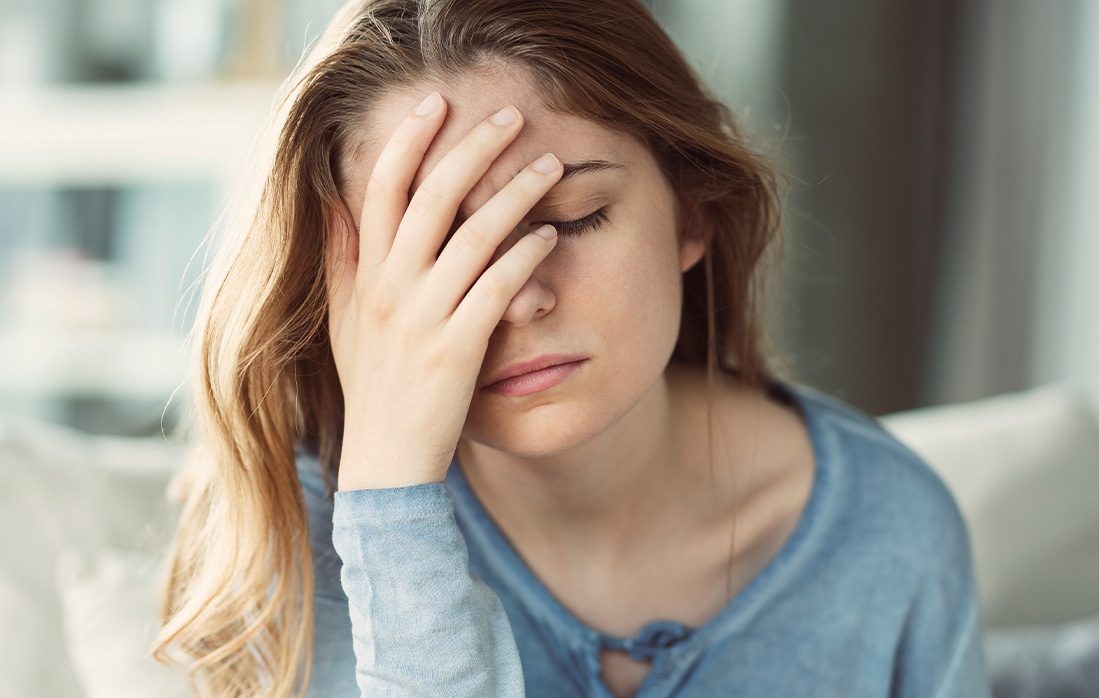The sleep disorders we see most often are insomnia, parasomnia, sleep apnea, hypersomnia, and delayed sleep phase disorder. Insomnia is the most prevalent, with reports showing anywhere from 7% to 40% of adolescents meeting the diagnostic criteria for the condition. It is characterized by an inability to fall or stay asleep, resulting in poor sleep quality, daytime exhaustion, and problems with memory and concentration.
Can Sleep Disorders Cause Other Mental Health Issues?
Researchers have studied this question, and the answer appears to be yes.
How mental health conditions such as depression or substance use disorder develop is not entirely understood, but we do know that genetics, lifestyle, and other health conditions often play a role.
According to a longitudinal study that explored the relationship between substance use and sleep disorders in adolescents, deficits in sleep are closely intertwined with substance use disorder, particularly substances like alcohol and marijuana. Sleep deficiency has also been linked to depression, suicide, and impulsive behavior.
Teenage Sleep Problems: Treatment and Lifestyle Recommendations
When it comes to young adult and teenage sleep problems, treatment is a great option, but it doesn’t necessarily have to be the first course of action.
Some sleep disorders in young adults and teens can resolve on their own with proactive lifestyle changes. Others may require medical intervention. What’s important is that you pay attention to the signs of sleep deprivation and that you take your or your loved one’s sleep concerns seriously if/when they bring them up.
Things that teens and young adults can start doing right away to address their sleep problems include:
- Choosing a set bedtime (and sticking to it)
- Creating a relaxing bedtime routine to look forward to every night
- Aiming for 8-9 hours of sleep
- Avoiding blue light screens like phones and tablets within an hour of going to sleep
- Putting together a cozy sleep environment
- Avoiding heavy eating within an hour of going to sleep
- Maintaining regular sleep and wake times, even on weekends
- Getting in sufficient physical activity during the day
- Making sure to get direct sunlight upon waking
It may also be helpful for teens to track their sleep patterns using an app like Sleep Cycle. Doing so can point out clear patterns in sleep disruptions and provide useful information for a physician or counselor.
Professional Support for Sleep Disorders in Teens and Young Adults
Lifestyle adjustments are not always enough to solve sleep problems, especially if an underlying sleep disorder is at play.
We recommend scheduling an appointment with a primary care physician in order to discuss concerns and get a full check-up. If applicable, you should also speak openly with your child about the potential stressors in their life. It’s possible there are things you can do to lighten the load so they can get more sleep, such as scaling back after-school activities or establishing a family-wide screen blackout rule for the hour before sleep.
Because sleep disorders in young adults and teens can possibly cause or worsen certain mental health conditions, you may also want to seek out licensed mental health care. This could include choosing a residential treatment program where your teen can pursue rest and recovery in a safe, supportive, and home-like environment. Explore our website for additional information on teen and young adult mental health treatment, and please contact us online or at (855) 521-1634 to inquire about our separate residential young adult and adolescent mental health treatment programs.
Source link

It’s easy for sleep disorders in teens and young adults to get missed or misconstrued. After all, it’s not unusual for young people to have strange sleeping habits, and many people, teens included, experience sleep disruptions when they’re dealing with stress, excitement, or anxiety. But true sleep disorders in young adults and teens require a proper diagnosis – and an effective course of treatment.
Paradigm Treatment provides mental health services for teens and young adults at residential centers located in Texas, California, and Idaho. If there’s a teen (or young adult) in your life who is exhibiting some troubling signs around sleep, read on for our quick explainer on sleep problems, and get in touch for a consultation regarding these or other mental health concerns.
Signs My Child Isn’t Getting Enough Sleep
One question we get all the time on the topic of teen and young adult sleep disorders is, what are some signs my child isn’t getting enough sleep?
People need varying levels of sleep and may react differently to getting less (or more) than normal. That being said, there are some telling signs that a teen or young adult may be struggling with a sleep disorder, including:
- Exhaustion upon waking
- Sudden changes in mood or behavior
- Spending a lot of time in bed or frequent daytime naps
- Inability to focus
- Drop in grades
The sleep disorders we see most often are insomnia, parasomnia, sleep apnea, hypersomnia, and delayed sleep phase disorder. Insomnia is the most prevalent, with reports showing anywhere from 7% to 40% of adolescents meeting the diagnostic criteria for the condition. It is characterized by an inability to fall or stay asleep, resulting in poor sleep quality, daytime exhaustion, and problems with memory and concentration.
Can Sleep Disorders Cause Other Mental Health Issues?
Researchers have studied this question, and the answer appears to be yes.
How mental health conditions such as depression or substance use disorder develop is not entirely understood, but we do know that genetics, lifestyle, and other health conditions often play a role.
According to a longitudinal study that explored the relationship between substance use and sleep disorders in adolescents, deficits in sleep are closely intertwined with substance use disorder, particularly substances like alcohol and marijuana. Sleep deficiency has also been linked to depression, suicide, and impulsive behavior.
Teenage Sleep Problems: Treatment and Lifestyle Recommendations
When it comes to young adult and teenage sleep problems, treatment is a great option, but it doesn’t necessarily have to be the first course of action.
Some sleep disorders in young adults and teens can resolve on their own with proactive lifestyle changes. Others may require medical intervention. What’s important is that you pay attention to the signs of sleep deprivation and that you take your or your loved one’s sleep concerns seriously if/when they bring them up.
Things that teens and young adults can start doing right away to address their sleep problems include:
- Choosing a set bedtime (and sticking to it)
- Creating a relaxing bedtime routine to look forward to every night
- Aiming for 8-9 hours of sleep
- Avoiding blue light screens like phones and tablets within an hour of going to sleep
- Putting together a cozy sleep environment
- Avoiding heavy eating within an hour of going to sleep
- Maintaining regular sleep and wake times, even on weekends
- Getting in sufficient physical activity during the day
- Making sure to get direct sunlight upon waking
It may also be helpful for teens to track their sleep patterns using an app like Sleep Cycle. Doing so can point out clear patterns in sleep disruptions and provide useful information for a physician or counselor.
Professional Support for Sleep Disorders in Teens and Young Adults
Lifestyle adjustments are not always enough to solve sleep problems, especially if an underlying sleep disorder is at play.
We recommend scheduling an appointment with a primary care physician in order to discuss concerns and get a full check-up. If applicable, you should also speak openly with your child about the potential stressors in their life. It’s possible there are things you can do to lighten the load so they can get more sleep, such as scaling back after-school activities or establishing a family-wide screen blackout rule for the hour before sleep.
Because sleep disorders in young adults and teens can possibly cause or worsen certain mental health conditions, you may also want to seek out licensed mental health care. This could include choosing a residential treatment program where your teen can pursue rest and recovery in a safe, supportive, and home-like environment. Explore our website for additional information on teen and young adult mental health treatment, and please contact us online or at (855) 521-1634 to inquire about our separate residential young adult and adolescent mental health treatment programs.
Source link




